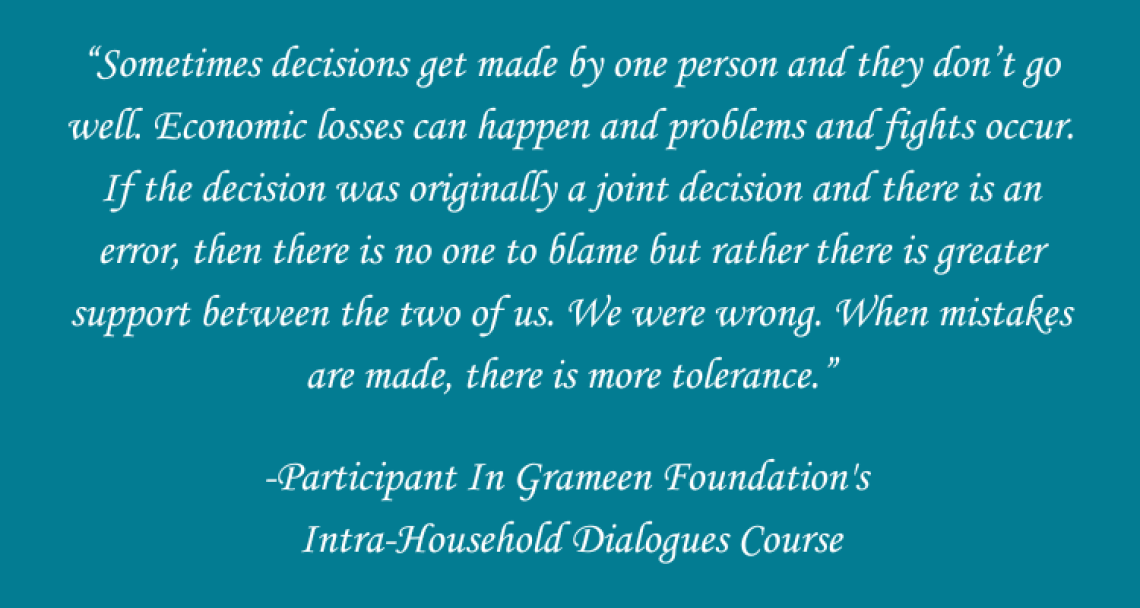Make your 2X MATCHED gift today!
This week only: Every $1 will be matched with $2 to enable women worldwide.
This week only: Every $1 will be matched with $2 to enable women worldwide.
Posted on 07/11/2024
In blogs 1, 2, 3, 4, 5 and 6 in this series on financial abuse, we announced Program SAFE, described the possible prevalence for financial abuse and some of Grameen’s early experiences studying financial abuse in Honduras, proposed practical steps financial service providers (FSPs) can take to address financial abuse, described Grameen’s use of its Exploring Power Dynamics workshop as a critical starting point for addressing norms within financial service providers themselves, described how to design financial services with safety in mind and described signs of financial abuse.
If you are in an intimate relationship with someone, how did you learn how to manage your finances with this person? Premarital financial counseling? Watching your parents and mimicking how they did it (or handling your money the complete opposite of how your parents did it)? Trial by fire?
I’d venture to say, most couples manage their money together, learning as they go, and hopefully rebounding from their mistakes. As many global statistics indicate, money is often the biggest source of arguments, causing many separations and divorces.

I have often shared with friends and colleagues about my first experience participating in a financial literacy course with my husband. We had been married for years and welcomed three children by the time we participated in the course. It was the first time we had an honest conversation about our financial goals instead of just putting out financial fires as they occurred. Some of our financial goals we shared, and others not. I wanted to save for our children’s education while he wanted to save for retirement. Both are important goals, but it’s difficult to achieve both effectively while managing other daily expenses. We had to consider how to prioritize and support each other's goals, acknowledging we both wanted the same things, just with different degrees of urgency.
As has already been referenced in this blog series on financial abuse, in patriarchal societies, social and gender norms and laws often allocate most decision making power in a husband’s favor (in almost all domains of life). This results in a highly unequal distribution of resources within a household, especially financial resources. Women often go into relationships with the understanding they will have little financial autonomy and this is reinforced by their male partner’s beliefs and behaviors, too.
Research has shown that households can make inefficient decisions regarding uses of income, where women and men both will give up larger income gains to maintain control over that income; this is especially true for women if they feel they have no bargaining power to control decisions or must maintain the norm that men should earn more than their partners (Baland JM and Ziparo R. 2018). Because individual incomes, savings, and private expenditures are not easily observed in developing countries, there are more incentives to hide income, resulting in suboptimal outcomes at the household level for the benefit of an individual (Fiala N, Xi H. 2016. Unitary or Noncooperative Intrahousehold Model? Evidence from Couples in Uganda. The World Bank Economic Review).

A recent study (Westmarland N and Žilková Z. 2023) in the United Kingdom revealed that most men managed their finances based on cues they received from society --either through the gender norm that men are breadwinners and therefore the main decision makers or through social media personalities promoting the need to move away from notions of financial equality to “reinscribe men’s power and control over women.” Men drew little on lessons learned from watching their parents because it was only when there were financial crises or arguments that they paid attention to what their parents were doing. In short, men went into their relationships with little background on how to manage their finances with another person, except with the idea they would likely be in charge. I’d say, this would be common across many contexts around the world. While I’d like to say my husband and I both walked into marriage with some strong financial identity, as if our parents had passed down some important financial lessons or traits to us, we were also blank slates.
Most of the financial literacy training we’ve developed as a financial services sector assumes people are independent decision makers. There are few financial literacy models that invite clients along with other household members to discuss financial management as a team--it’s almost always directed at individuals and we leave it up to them to interpret lessons to their families. But the reality is most people manage their money with others. If supported, couples can learn to positively work together, building their accountability to and trust of each other as members of the same team. My husband and I felt participating in the financial management course really changed the way we worked as a team.
In Grameen's study in Honduras, after couples supported by our microfinance partner had participated in an intra-household dialogue about decision-making at home, a man shared that he considered how joint decision-making also created joint accountability, especially if things don’t go according to plan.

While it seems all couples would benefit from participating in financial management training together, the research above also suggests as individuals, and especially for women with little bargaining power, preserving privacy is paramount. This is a tension we have to consider thoughtfully. Where safe, and where couples want to work together to improve household financial management, providing this sort of training to couples is needed, particularly among newly coupled or married people. Some men--and their partners--may not even realize their behaviors are controlling, coercive, or abusive because they see it as the norm. The financial services sector has the opportunity to change this by promoting values of financial collaboration and partnership. A simple place to start to achieve this is how we develop and promote financial literacy among the populations we serve. But we also have to preserve individuals’ rights to safe and secure places to privately save, borrow, transact and insure themselves.
In our next blog, we’re excited to invite a guest blog contributor to discuss the relationship between financial abuse and fraud!